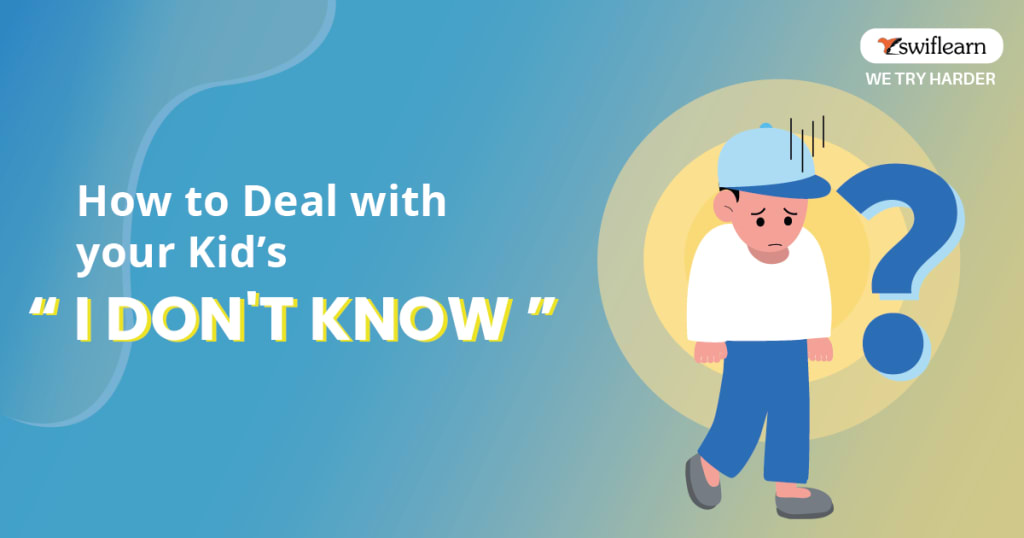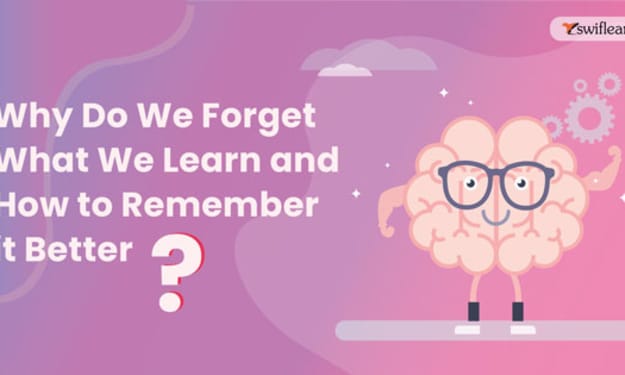How to Deal with your Kid’s “ I Don’t Know ” - Swiflearn
There are numerous times that you have to go through this as a parent or a mentor even when you knew that they know the answer. At times in a family gathering or in a party where your friends or relatives wanted to know how smart your kid is and they have recently learned a long poem by heart and you were confident that your kid is going to recite for them and they end up saying “ I Don’t Know ”.

There are numerous times that you have to go through this as a parent or a mentor even when you knew that they know the answer. At times in a family gathering or in a party where your friends or relatives wanted to know how smart your kid is and they have recently learned a long poem by heart and you were confident that your kid is going to recite for them and they end up saying “ I Don’t Know ”.
These are the times that shocks and frustrates parents that they were confident that their kid is doing well in academics and remember things for long but they fail.
It is important to deal with “ I Don’t Know ” on time and understand that something is not right.
Reasons for a kid to say “ I don’t Know ”
It’s more important for parents to understand why their kids say “ I don’t know ” before figuring out how to deal with it. Here are the few reasons for your kids “ I don’t know ”
– It’s an easy way to hide rather than be truthful for what they have done– Too distracted or was daydreaming to be in the current task or situation– It's tough to explain what they are thinking and need more time to figure out what is going on in their mind– Either they are too afraid or too embarrassed to tell as this may invite troubles to them.
These are the most common reasons for a kid to say “ I don’t know ” too often. You should not take I don’t know for granted as if you ignore/neglect you may indirectly provoke the sense of confidence in a kid that “I Don’t Know” is a life-saver and can be used to stay away from unnecessary troubles.
How to deal with It?
Hearing “ I Don’t Know ” too often can be difficult for parents but the parents need to deal with patience and the best way to know what’s going on in your kid’s mind is by asking questions and answers to him/her in a simple form.
Also Read: Things To Do When Kids Say ‘I am Bored’
Ask Simple Questions
Kids do not understand beating around the bush, therefore, try close-knitted simple questions with a Yes or No. Avoid open-ended questions or conversations which may end up with another “ I don’t know ” as an answer rather be specific with your questions like:
The question to Avoid (Open-Ended)
What are you thinking about?
The question to Ask (Close-Knitted)
Are you thinking about your favorite movie?
The Question to Avoid(Open-Ended)
When would you do your homework?
The Question to Ask(Close-knitted)
Would you like to do homework in the evening or right now?
Kids would have an answer when they have options to choose from. It not only increases the chances of conversation with them but will also help to build further communication as “ I don’t know ” is a simply disinteresting sign for a kid to communicate with the parents.
Sign up for free trial classes at Swiflearn
Use your Kid’s Imagination
There are chances that the child may not fall into close-knitted questions too and get irritated easily. Whenever this situation arrives you can simply swap to imagination mode rather than question mode. A kid is excited when someone talks about their daydreams or wants to listen to their imaginations.
For Eg: You can use phrases or ask imaginative questions like– If You were at my place what would you do?
The Question to avoid(Open-Ended)
What do you want to do now?
The question to Ask ( Imaginative)
If I would’ve been you what should I be doing now?
This tricky way will not only help you understand what’s going on in your child’s mind but will also help them develop their imaginative skills which are required in everyday life and will become better learners. Once you know what’s going on in your child’s mind you easily know how to deal with it rather than sitting confused on a blunt “ I don’t know ”.
Also Read: Improving Reasoning And Thinking Ability In Children
Few Questions that can develop a more confident communicator and would make the bridge of the communication gap would be like asking frequently used questions like
– Could you help me with a little more information on that?– Do you want me to ask for a friend’s help?– Would you like to take a little more time and figure out and talk to me?– Would you discuss this with me while we watch cartoons together?– Let’s imagine and role-play the situation than talking or maybe draw the situation?
These frequently asked questions will not only help to understand the situation well for the parents but will also help to cope up with the “ I don’t know ”. Your kid looks up to you and you are his first best friend If coped up with this situation well and most important on time you are going to enjoy a lifelong healthy and emotional relationship with your children.
Article Source: https://swiflearn.com/blog/how-to-deal-with-your-kids-i-dont-know/





Comments
There are no comments for this story
Be the first to respond and start the conversation.